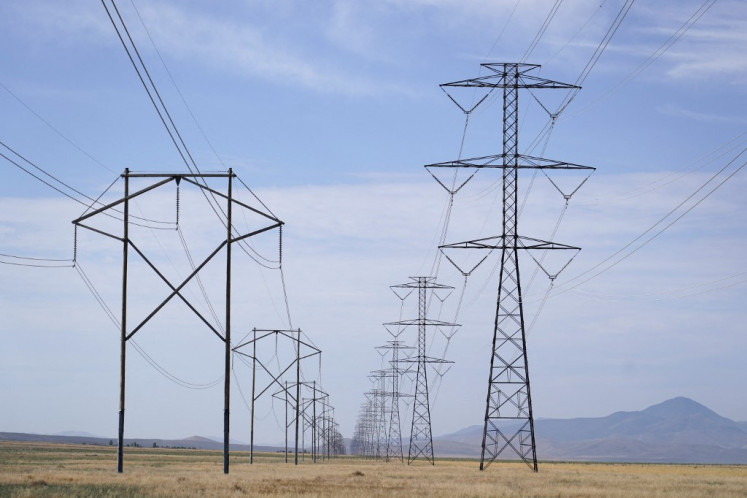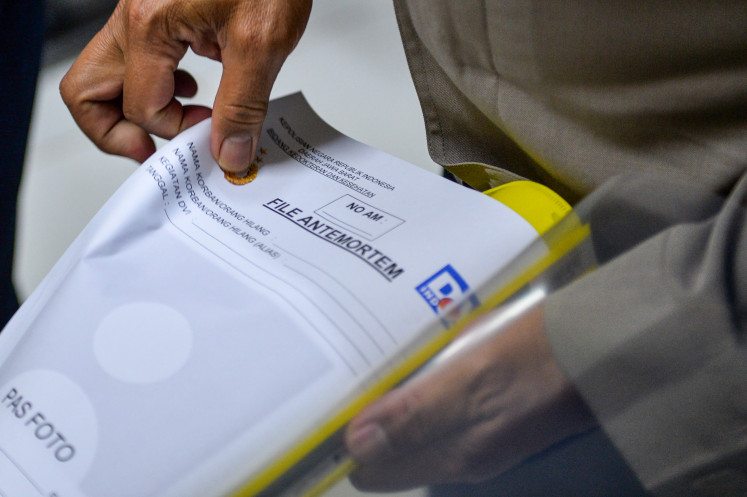Rigorous campaigns on sustainable palm oil needed in Europe: Bappenas
Change text size
Gift Premium Articles
to Anyone
 Crisis: Rows of oil palms are pictured at an Indonesian plantation. With such plantations being accused of triggering land and forest fires, the National Development Planning Agency says Indonesia needs to intensify its campaign on sustainable palm oil to save the country’s palm oil industry. (pajak.go.id/-)
Crisis: Rows of oil palms are pictured at an Indonesian plantation. With such plantations being accused of triggering land and forest fires, the National Development Planning Agency says Indonesia needs to intensify its campaign on sustainable palm oil to save the country’s palm oil industry. (pajak.go.id/-)
I
ndonesia should strengthen campaigns on sustainable palm oil in European countries to tackle charges against the product that could affect the country’s palm oil industry and exports, an official has said.
"Indonesia needs to intensify its campaigns on sustainable palm oil and nutritious substances, such as vitamins, contained in the commodity," the National Development Planning Agency’s (Bappenas) director for trade, investment and international economic cooperation, Amalia Adininggar Widyasanti, said on Friday.
She made the statement in response to ongoing pressure against the world’s palm oil industry.
Recently, France reportedly imposed a new palm oil import tax of €403 (US$443.28) per ton, up from €103 per ton. The policy has drawn sharp protests from oil palm plantation communities in Indonesia as it could set a precedent for other countries.
Indonesia has undertaken several initiatives, such as Indonesian Sustainable Palm Oil (ISPO) and the Roundtable for Sustainable Palm Oil (RSPO), to improve practices in its palm oil industry. Still, it is facing tough challenges from Western countries, whose concerns are mostly focused on peatland fires.
“We need to first change their perspective,” said Amalia, referring to widespread views that oil palm plantations are responsible for environmental damage, especially land and forest fires triggered by forest conversion and peatland drainage carried out by the plantation sector.
Supported by data, local and regional scientists are reportedly striving to introduce the benefits of sustainable palm oil to the public. However, several significant scientific institutions in Europe have tended to dominate the discourse, placing the palm oil industry in a corner.
"In their visits to Indonesia and Malaysia, European civil groups have never made any comprehensive measurements [of local conditions]. They have always analyzed the situation based on methods in their countries. Tropical soil is different," Lulie Melling from Tropical Peat Research Laboratory (TPRL) Malaysia told thejakartapost.com in a recent interview.
Lulie commented that research activities based on local land characteristics needed to be carried out intensively. There should be new methods for sustainable oil palm plantations so they could increase their bargaining power against counterproductive palm oil campaigns, she said.
"Valid data is important for us to argue but currently we are dominated by European perspectives. For example, of 14 peat congresses, all were held in Europe. The upcoming 15th peat congress will be the first congress to be held in a tropical country, namely Malaysia in August," Lulie said.
She argued that palm oil was still the best option for vegetable oil. Citing examples, she said the output of oil palm plantations could reach 5,950 liters of oil per hectare, while rapeseed, soybean and corn could produce only 1,190, 446, and 172 liters of oil per ha respectively.
"If there is no palm oil, and you replace it with rapeseed, you will need four times more land and that does not mean less pollution," Lulie said. (ebf)









